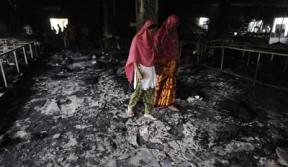By Alison Maitland in London
Social audits of clothing factories in developing countries are failing to
detect excessive and forced overtime, abusive treatment of workers and violations of freedom of association, says a report by the Clean Clothes Campaign, a coalition of trade unions and pressure groups, to be published
today.
Interviews and focus groups with 670 workers in 40 factories producing clothing and sports shoes for big brands, retailers and mail order companies found that the audits, commonly used to check compliance with codes of conduct, were often short, superficial and sloppy.
"The auditors are always in a hurry. They sometimes only use their eyes and never engage the workers," said one employee quoted in the report, at a factory in Kenya producing goods for Wal-Mart, the US retailer. "They must talk to us if they truly want to know our problems."
Other workers implied they were deliberately kept away from auditors or that steps were taken to minimise the impression of overtime. "Whenever social auditors come to this factory, we are given holiday," said a worker
in an Indian factory supplying European companies such as KarstadtQuelle,
Otto Versand and Littlewoods.
"Workers don't participate and the reality in the workplace is missed,"
said Ineke Zeldenrust of the Amsterdam-based campaign.
Other workers said they were interviewed in front of managers and were therefore too frightened to reveal problems in their factory, according to
the report, entitled Looking for a Quick Fix.
It said auditors were making it too easy for factories to receive positive
evaluations and managers deceived auditors, notably by coaching workers to give false or incomplete information.
"Audits are often not followed by effective remediation," it said.
"Improvements at the workplace are limited to health and safety issues and
tend to be superficial."
The report was funded by the Dutch foreign affairs ministry and based on research in Bangladesh, China, Kenya, India, Indonesia, Morocco, Pakistan and Romania.

